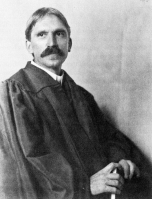|
阅读约翰·杜威 John Dewey在百家争鸣的作品!!! |
约翰·杜威(英语:John Dewey,1859年10月20日-1952年6月1日)是美国著名哲学家、教育家、心理学家,与查尔斯·桑德斯·皮尔士、威廉·詹姆士一起被认为是美国实用主义哲学的重要代表人物,也被视为是现代教育学的创始人之一、机能主义心理学派的创始人之一。
杜威在学术生涯中,曾先后于美国密歇根大学、芝加哥大学、哥伦比亚大学长期任教,并在哥伦比亚大学退休。杜威一生极力推崇民主制度,强调科学和民主的互补性,民主思想是他众多著作的主题。与此同时,他也被视为二十世纪最伟大的教育改革者之一。在芝加哥大学任教期间,他创立了芝加哥大学附属实验学校作为他教育理论的实验基地,其太太担任学校校长。
杜威的思想曾对二十世纪前期的中国教育界、思想界产生过重大影响,培养了包括胡适、冯友兰、陶行知、郭秉文、张伯苓、蒋梦麟等一批国学大师和学者。 他也曾到访中国,两年间在全国各地举办了数百场讲座,见证了五四运动,并与孙中山会面,促进了民主、科学的思想在中国传播。 杜威是二十世纪上半叶美国最著名的学者之一,2006年12月,美国知名杂志《大西洋月刊》将杜威评为“美国历史上最具影响力的100位人物(The 100 Most Influential Figures in American History)”第40名。
John Dewey (/ˈduːi/; October 20, 1859 – June 1, 1952) was an American philosopher, psychologist, and educational reformer whose ideas have been influential in education and social reform. He is regarded as one of the most prominent American scholars in the first half of the twentieth century.
The overriding theme of Dewey's works was his profound belief in democracy, be it in politics, education, or communication and journalism. As Dewey himself stated in 1888, while still at the University of Michigan, "Democracy and the one, ultimate, ethical ideal of humanity are to my mind synonymous." Known for his advocacy of democracy, Dewey considered two fundamental elements—schools and civil society—to be major topics needing attention and reconstruction to encourage experimental intelligence and plurality. Dewey asserted that complete democracy was to be obtained not just by extending voting rights but also by ensuring that there exists a fully formed public opinion, accomplished by communication among citizens, experts, and politicians, with the latter being accountable for the policies they adopt.
Dewey was one of the primary figures associated with the philosophy of pragmatism and is considered one of the fathers of functional psychology. His paper "The Reflex Arc Concept in Psychology," published in 1896, is regarded as the first major work in the (Chicago) functionalist school. A Review of General Psychology survey, published in 2002, ranked Dewey as the 93rd-most-cited psychologist of the 20th century.
Dewey was also a major educational reformer for the 20th century. A well-known public intellectual, he was a major voice of progressive education and liberalism. While a professor at the University of Chicago, he founded the University of Chicago Laboratory Schools, where he was able to apply and test his progressive ideas on pedagogical method. Although Dewey is known best for his publications about education, he also wrote about many other topics, including epistemology, metaphysics, aesthetics, art, logic, social theory, and ethics.
